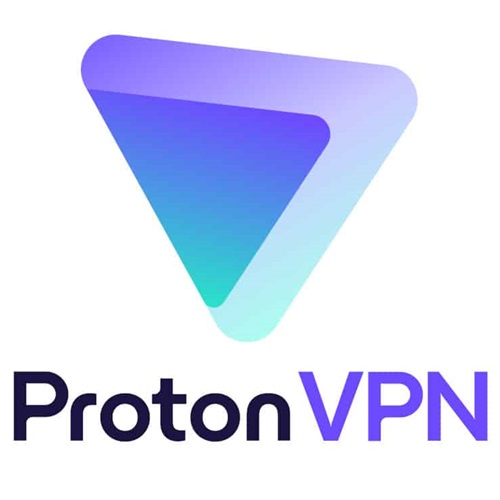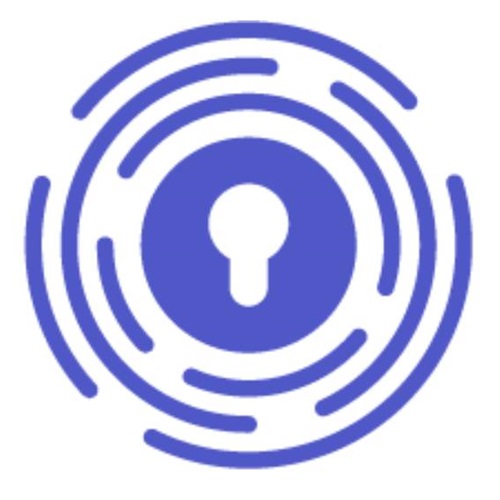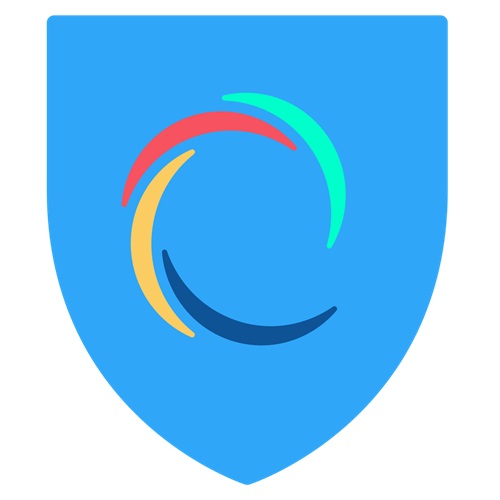Free VPN services have become popular thanks to increasing threats against online privacy. Unfortunately, just like in the case of using pirated software, users often do not fully understand the risks of what they seek. That's why choosing the best free VPN is increasingly vital.
Using some free VPN services (legal, by the way) could expose users to higher danger levels. It is important to note that there are various kinds of free VPN services, and the distinction is essential. Still, some viable VPN service providers provide some form of free services. Here are our favorite free VPN brands.
Quick Summary: Our Top 5 Best Free VPN Picks

Whether you're streaming, browsing, or just safeguarding your digital footprint, these top-notch free VPNs promise to keep you covered while keeping your wallet full. Let's dive in and explore how you can surf the cyber waves with confidence and zero cost!
1. ProtonVPN
Website: https://protonvpn.com/
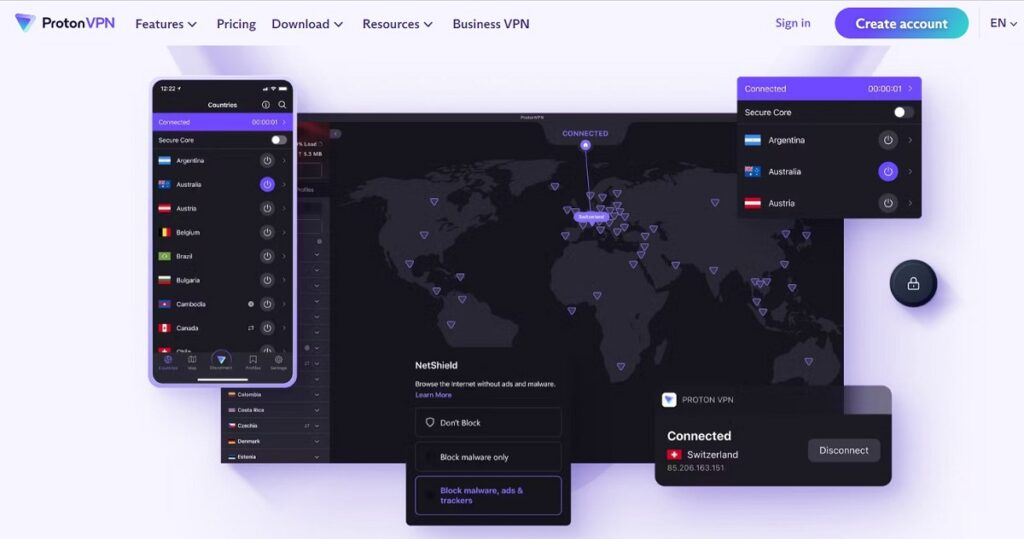
In the vast universe of free VPN services, ProtonVPN shines brightly as a stellar option. Developed by the scientists at CERN and protected by Swiss privacy laws, ProtonVPN is a free VPN service that highly emphasizes user privacy and security. Their free plan offers features often only found in premium VPN services.
Unlike many free VPNs that monetize through ads or selling user data, ProtonVPN is subsidized by its paid users, ensuring your browsing history stays private. It offers a unique set of VPN Accelerator technologies that can improve speeds by over 400%, providing a high-speed and unrestricted internet experience.
For their premium plan upgrades, ProtonVPN charges in Euro since they are based in the region. Expect to pay more for month-to-month subscriptions. You'll save the most on their 2-year plan, with monthly prices dropping to around $5.43. that's still quite pricey for a paid VPN plan.
Pros
- Strong privacy policy
- No data logging
- High-end security protocols
- User-friendly interface
- Supports multiple platforms
Cons
- Limited free server locations
- No P2P on free version
2. PrivadoVPN
Website: www.privadovpn.com
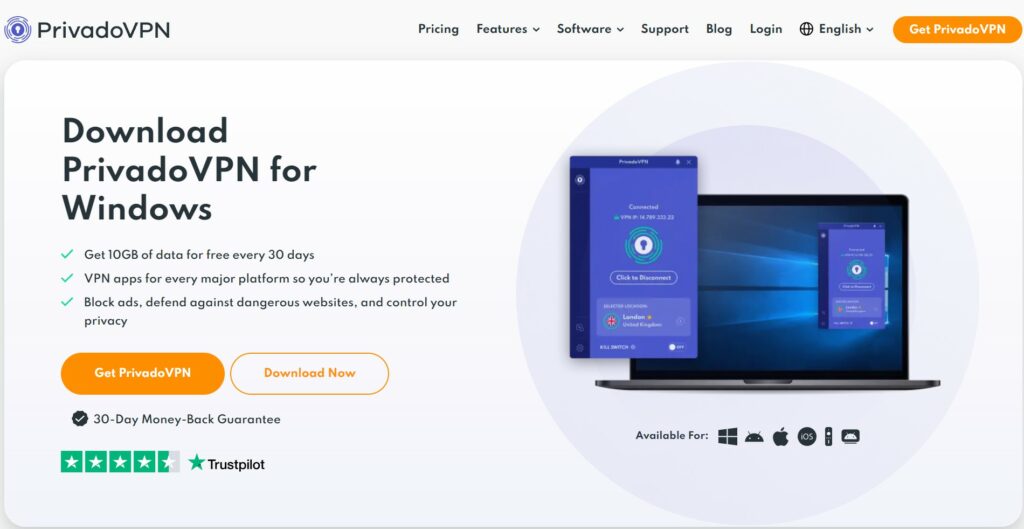
PrivadoVPN's free service offers a commendable range of features typically found in premium VPN offerings. This includes access to 12 server locations worldwide, which is quite impressive for a free service. It also provides a zero-log policy, meaning it doesn't record your online activities.
What sets PrivadoVPN apart from many other free VPN services is its commitment to providing a high-speed and unrestricted internet experience. While many free VPNs limit your data usage or throttle your speeds, PrivadoVPN offers a generous 10GB of monthly data with no speed restrictions.
It's certainly a cut above some brands that claim to offer a free plan but cripple you with so many limitations to be practically unusable. Give PrivadoVPN a try today; you won't be disappointed. While their sign-in process is a bit unusual, the overall quality of service is pretty good.
Pros
- Strong encryption
- No logs policy
- Fast connection speeds
- 12 free server locations
- P2P support
Cons
- No ad blocker
- 10GB monthly data limit
3. AtlasVPN
Website: www.atlasvpn.com
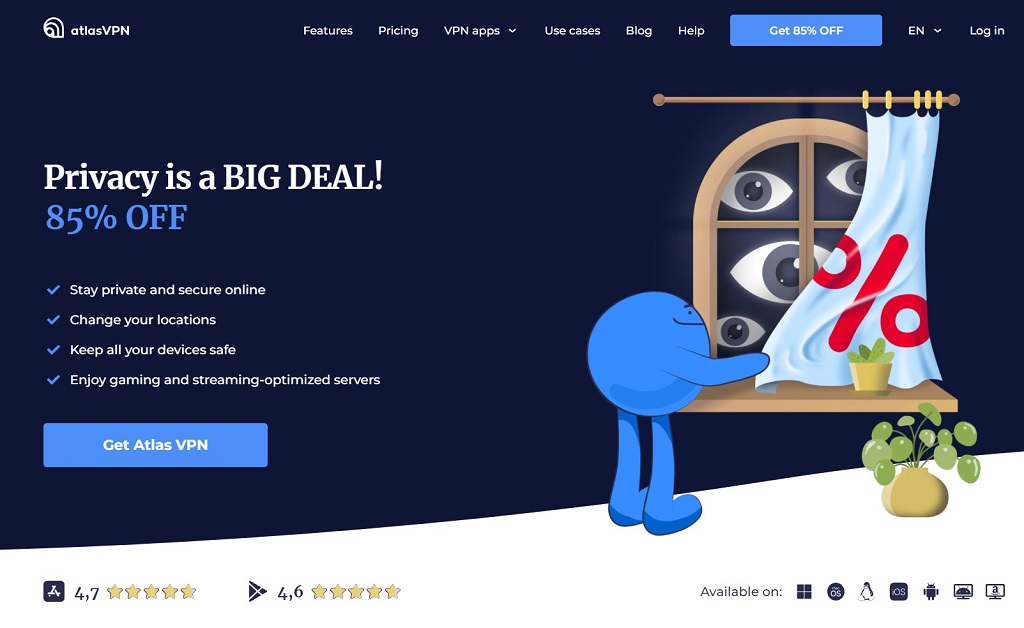
AtlasVPN has established itself as a reliable and trustworthy VPN provider. Despite being a free service, it offers a range of features that are on par with many premium VPNs, making it a popular choice among users who prioritize online privacy and security. So impressive was the original service that AtlasVPN was acquired by Nord Security, makers of NordVPN.
Still, it remains independently branded and continues to provide its free plan to everyone. It offers three free server locations, no speed limits, and allows for unlimited devices. This is quite impressive for a free service and provides users with flexibility and freedom often lacking in other free VPNs.
With its robust features and user-friendly interface, AtlasVPN is a strong contender in the realm of free VPN services. Even if you hit their free plan limits, AtlasVPN's premium plan upgrade is much more wallet-friendly than most other free VPN providers.
Pros
- Strong encryption standards
- No logs policy
- Unlimited bandwidth
- P2P support available
- Blocks trackers and ads
Cons
- Limited server locations
- Slower speeds on the free version.
4. Hotspot Shield
Website: https://www.hotspotshield.com
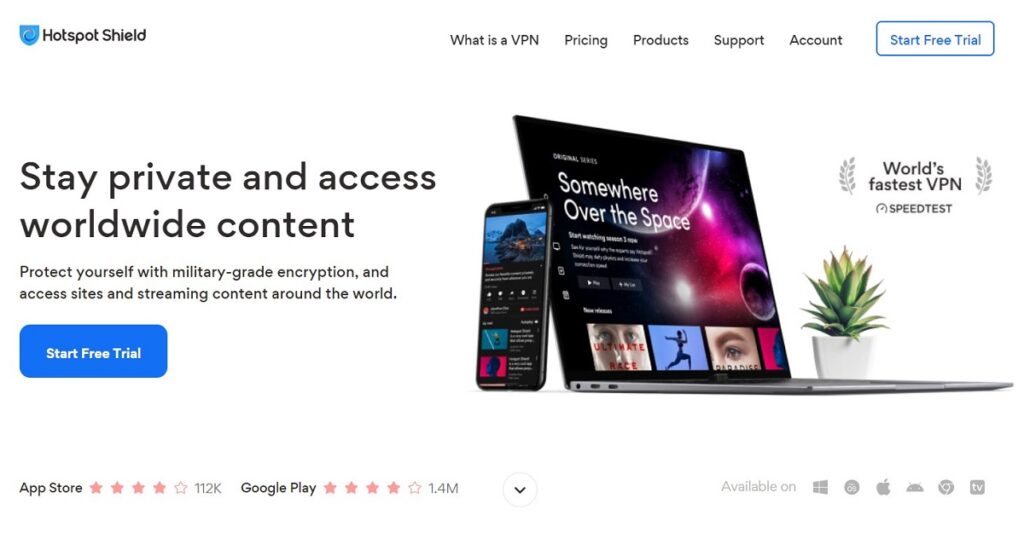
Hotspot Shield distinguishes itself as a leading contender in the crowded landscape of free VPN services. Known for its blazing-fast speeds and military-grade encryption, Hotspot Shield is a reliable and trustworthy VPN provider. Founded in 2005, the brand has survived admirably through the years.
Today, it offers both free and paid services. Here comes the real shocker, though. Hotspot Shield does not impose any monthly data caps on their free plan. However, some catches exist, such as the inability to game or stream videos with the service. It's a small price to pay for unlimited privacy.
Unfortunately, you're also limited to a single virtual location. We still feel that having no data cap is a pretty good deal. The only questionable part about having a single location is the potential impact on your digital privacy. Their premium service removes those restrictions but will set you back a whopping $7.99 monthly if you sign up for an annual plan.
Pros
- High-speed connections
- Military-grade encryption
- P2P support on free plan
- 500 MB daily data limit
- Good for streaming
Cons
- Ad-supported free version
- No Netflix on the free plan
5. TunnelBear
Website: https://www.tunnelbear.com
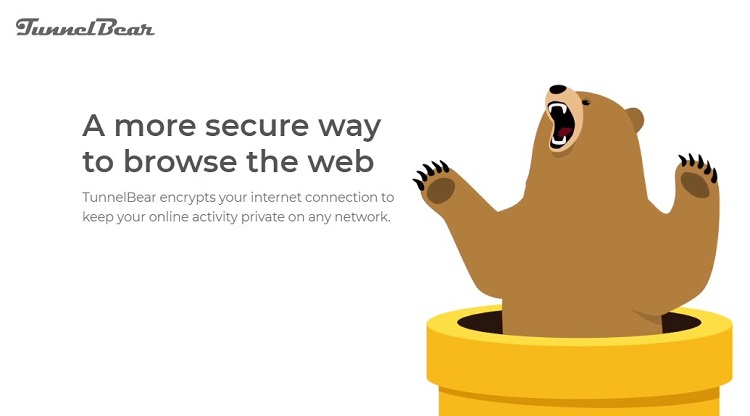
TunnelBear offers perhaps the least amount of data on their free account as anyone is the market. 500MB per month isn’t enough to fit a gnat through, and I can guarantee you’ll be facepalming in frustration within the first few hours of using their free service.
There is a way to worm around this quote since they offer users who tweet about their service a bump up with an additional 1GB of bandwidth. I’m not sure how often you can exploit this promo, but I’m sure you’ll get sick of Tweeting for bandwidth very quickly.
However, they have a decent reputation in the market, and opting for their paid service will open a larger network of servers. Opting for their annual plan works to around $4.99 per month based on annual billing.
Another thing to note is that Tunnelbear was bought by McAfee in 2018, so their integrity might become a little suspect.
Pros
- Strong encryption
- No logging policy
- User-friendly interface
- 500MB monthly data allowance
- Fun and engaging design
Cons
- Limited monthly data
- Slower speeds on the free plan
- No torrenting support
6. Hide.me
Website: https://hide.me
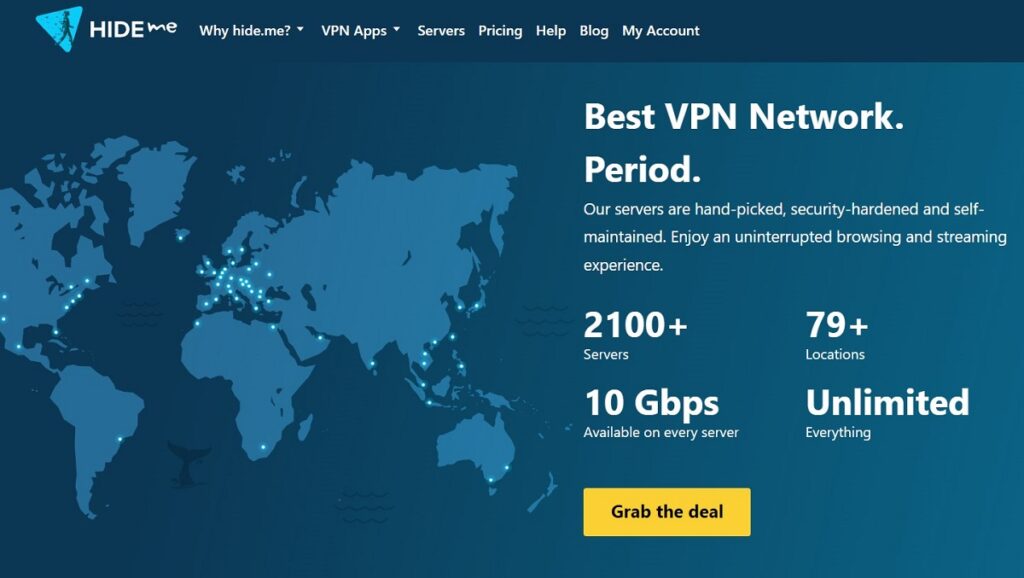
Hide.me is another free VPN provider that doesn’t believe in modesty. I’ve typically found that any VPN service provider that includes the word ‘fastest’ in their marketing spiel generally isn’t. The free option for Hide.me comes with 2GB of data and allows a single device to connect to any of five locations.
The limitations are severe and real but offer VPN novices an excellent opportunity to test out the experience of using a VPN. If you get tired of those restrictions and choose a paid plan on Hide.me, their Premium tier starts from $5.41 per month.
Moving to that gives you unlimited bandwidth and increases the number of servers you can connect to. You also have the option to change your mind since a 30-day money-back guarantee comes with their paid plans.
Pros
- Strong encryption
- No ads
- 10GB monthly data
- No speed throttling
Cons
- One device limit
- No Netflix access
7. Windscribe
Website: https://windscribe.com/
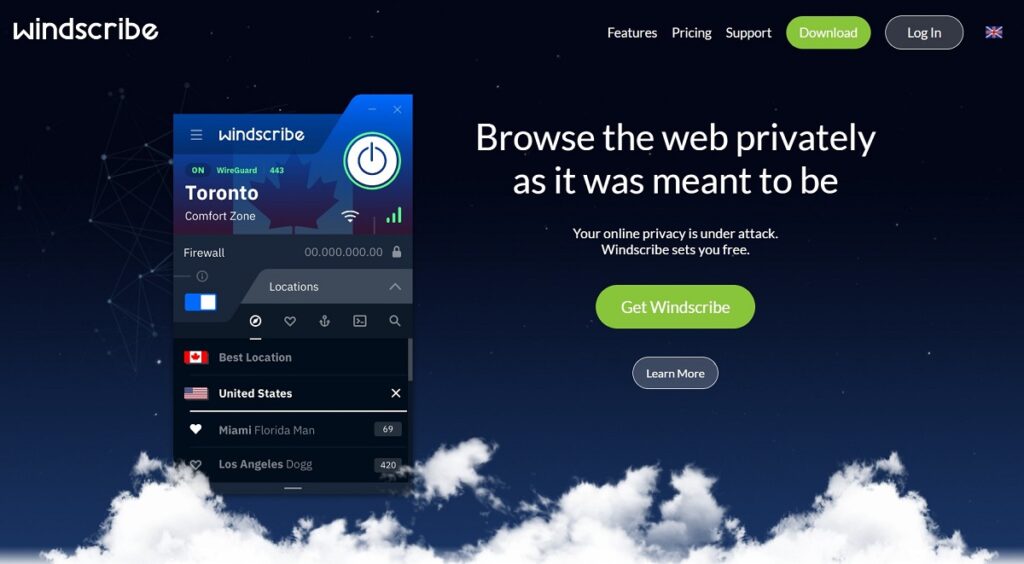
The free version of Windscribe gives you access to around ten VPN servers. These are located mostly in the US or Europe and do not cover the Australasia region. 10GB per month of bandwidth isn’t enough to cover a regular connection, but it could be helpful in a pinch if you want to cover sensitive situations.
They have a range of apps that you can install on several devices. This includes desktop client applications for Windows, Mac, or Linux. Aside from that, you can opt for a browser extension on either Chrome, Firefox, or Opera. If you’re using Windscribe on mobile, they have mobile apps for iOS and Android.
If 10GB per month of bandwidth isn’t enough for you, then you need to look towards their Pro plan, billed monthly or yearly. Yearly plans offer the greatest savings, working out to a rate of roughly $4.08 per month.
Pros
- 10GB monthly data allowance
- Strong encryption
- No identifying logs
- Ad and tracker blocker
- Supports torrenting
Cons
- No Netflix with the free version
- 1 device connection limit.
How We Test The Best Free VPNs
Our approach to testing the best free VPNs combines technical evaluations and user experience assessments. This helps ensure that the VPNs we recommend are free but also reliable and secure. Here's an insight into our rigorous testing methodology:
- Security and Privacy Checks: The cornerstone of any VPN service is its ability to protect your data. We evaluate each VPN's encryption methods, security protocols, and privacy policies. This includes checking for DNS and IP leaks, analyzing their logging policies, and assessing the strength of their encryption techniques.
- Speed and Performance: A VPN shouldn't slow you down. We test connection speeds across various servers to assess any impact on internet speed. This includes both download and upload speeds as well as latency. We conduct these tests on different networks (like WiFi, 4G, and broadband) to gauge performance under various conditions.
- Server Availability and Locations: The number and location of servers can greatly impact a VPN's performance. We assess the geographical distribution of servers, focusing on the diversity and strategic placement that affects accessibility and speed.
- User Experience: We explore the VPN's user interface and ease of use. This involves testing the setup process, ease of connecting to different servers, and the overall user interface design.
- Compatibility and Features: A good VPN should work seamlessly across various devices and operating systems. We test VPNs on multiple platforms to ensure compatibility. We also look for additional features like a kill switch, split tunneling, and P2P support.
- Customer Support: Reliable customer support is crucial, especially for users new to VPNs. We evaluate the responsiveness and helpfulness of each VPN's customer service team.
Is It Safe to Use a Free VPN?
Warning: NEVER use a free VPN that does not offer options to upgrade to a paid plans. They are highly likely to be unsafe and will possibly sell your data.
One of the most frequent questions we get asked is whether free VPNs are truly secure. Do they compromise your privacy and security? Understanding the safety of free VPNs is crucial, and much of it hinges on the reputation of the VPN provider and the transparency of their operations.
The safety of a free VPN is primarily determined by its privacy policy. Always review the policy carefully to understand what data the VPN collects, how it's used, and whether it's shared with third parties. A safe, free VPN should have a strict no-logs policy, meaning it doesn't store any data about your online activities.
However, one of the most vital safety factors is the free VPN provider's reputation. You should always consider VPN providers with a track record of prioritizing user privacy and security. This can often be gauged through online reviews, expert opinions, and user feedback.
Free VPN vs Paid VPN Plan: What's The Difference?
Free VPNs and a paid VPN plan are similar but come with some vital distinctions. While the features mostly mirror each other, the difference often lies in the scope of those features. For example, a free VPN may offer access to a few servers, while a paid plan increases the number of server locations.
Other differences between free and paid VPNs include:
- Data and Speed Limitations
- Security and Privacy Options
- Customer Support and Service Reliability
- Additional Features Like Adblocking
How Good Are Free VPN Services?
While free VPNs can be a great entry point for those new to VPNs or with minimal requirements, their performance and features are often limited compared to paid versions. Here's an evaluation of how good free VPNs can be in various aspects:
- Free VPNs generally provide basic privacy and security.
- For basic browsing and online activities, free VPNs can offer adequate speed.
- Many free VPNs are pretty reliable for basic use but will offer minimal customer support.
- Due to limited servers and bandwidth, free VPNs are usually unsuitable for streaming media.
- Some free VPNs may serve ads, possibly compromising your privacy.
Conclusion: Finding Your Perfect Free VPN
The world of free VPNs offers a variety of options, each with its strengths and limitations. Understanding these aspects is crucial in selecting a VPN that protects your online activities and enhances your internet experience.
Honestly, we are not overly fond of free VPNs since most of them charge high prices for premium upgrades. We recommend considering a premium VPN brand like NordVPN straight off. It costs only $3.79/mo for their 2-year plan and is a highly reliable brand.
Nevertheless, choosing a VPN is a personal consideration. The best free VPN for you balances your desire for privacy and security with the realities of free service offerings. With the right choice, you can enjoy a safer and more private browsing experience.
